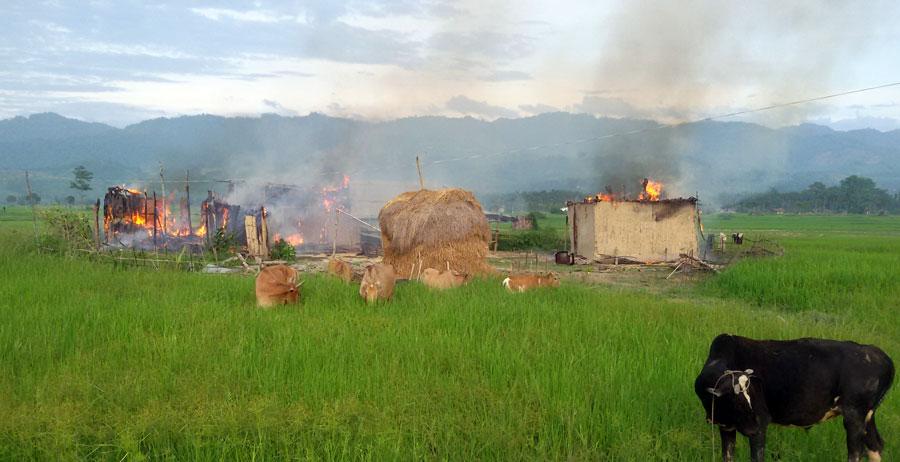"You may be strong on legal and constitutional considerations, but we are strong on the ground and our claim is based on history and tradition" (When we mention that Dimapur was the capital of ancient Dimasa Koch Kingdom they draw blank).
This is how my counterpart from Nagaland closed his argument in Chumukdema commissioner level meeting in June 1985 in presence of IG Kharkwal and DIG Sagar. On return to Golaghat, we came to know the Assam-Nagaland border conflagration. The epicenter was Merapani.
Smokes were bellowing from the thatched houses, shops were left empty, cattle went off the cowsheds. Policemen could hardly escape. It took us half an hour to verify the ghastly scene and trail of depredations left behind by the marauders. That ominous word heard at Chumukdema came true so soon. Attack on Merapani came in a bizarre and surreptitious way when meeting was still underway.
Early next day Union minister of state for home Ramdulari Sinha accompanied by the then chief minister Hiteshwar Saikia and his Nagaland counterpart SC Jamir visited Merapani. Myself and DC Jorhat Chida Barua were present.
On seeing the butchered cattle heads at Merapani on roadside and drains, the union minister looked towards me and enquired "who has done this". Not Assam. The two words I could utter at that moment. But regained my confidence to speak out again pointing towards Nagaland "they have done when we were talking peace yesterday at Chumukdema". Nagaland chief minister got instantly infuriated and talked to Saikia. Suddenly, the strong exchange of words erupted between Saikia and Jamir. The situation took a normal turn only after Chida Barua managed to diffuse it.
Since 1963, when Nagaland became full fledged state, there has been simmering boundary row between the two states and at times scaling up to war like situation. This time around flare up started from a minor land dispute between a Naga 'owner' and Assam cultivator. In a charged atmosphere, however small incidents may be they had the potential to trigger major crisis. This has to be clearly understood by the local administration and they deal with it in the initial stage.
After each of the major incident, dialogues are organized in a routine fashion. Once again same hackneyed decisions are repeated. These include maintenance of status-quo border meetings at different labels, activating neutral force, intensified patrolling, preventing crimes such as cattle lifting, forcible harvesting, theft, tax collection, kidnapping etc. government succor is distributed to affected families and slowly burnt villages start coming alive once again. Even in the face of ever lurking fear victims have no other option but to return and grow subsistence food for survival. After a tragedy, for a while things seem to be gearing for peace and normalcy as administrative functionaries become visible but soon slump and slackness overtakes as usual. In eighties there used to be regular Chief Secretary, Commissioner level meetings which helped in defusing many a flash points. This practice seems to be discontinued or become rare. This time around there is assurance that disputes would be resolved amicably and a joint mechanism set up for the purpose etc. However, if past experience be any indicator such assurances end up as homilies and do not touch even the fringe of real problems. Are we not deluding ourselves by not taking head on the real concerns? As long as Nagaland Police illegally man posts inside Assam and gun totting NSCN cadres remain in the area to extend protective shield to Naga encroachers, bilateral peace talks without laying stress on these basic issues would reduce to only status-quo centric. If this is not brought on the agenda of meetings, a clear message would go that this is no longer an issue and the Assam government has acquiesced to continued presence of Nagaland police and NSCN cadre in the troubled area.
There are also reports that Nagaland Govt’s activities are on the increase in the area. On the other hand, presence of Assam forest department, the real custodian of troubled border land is not visible. It seems that their present role is limited to updating forest land coming under increasing encroachment. It is a sheer pity.
The effectiveness of the Neutral Force has reaised no less doubt. In absence of clearly laid down SOP this force, it is alleged, prefers to remain just 'neutral'. In other words, neutrality to them means avoidance, inaction and non-interference. The Neutral Force does not have adequate mobility, manpower and other operational logistics although they are deployed in the troubled area for nearly three decades.
From the recent contradictory statements coming from the Centre and state, with regard to command and control of the neutral force, it is apparent that there is confusion which is rather funny. Without clearly spelling out operational role and accountability neutral force is, thus, a mere show of uniform not force.
Let there be a comprehensive state policy to deal with all the border row in an holistic manner under one nodal authority. Enough with adhocism and knee jerk reactions. Looking at the nature and magnitude of inter-state border problems faced by Assam it may be expedient that a separate dept is created which will ,with undivided attention ,strive to free the encroached border lands and provide much needed protection to the people. Also it would be in state's interest that a dedicated police force, say two Battalion strength under the control of proposed new dept. is raised by trimming extra flab out of 50,000 strong police force and strategically deployed . In the event of Assam government’s 1988 petition being heard by the Supreme Court ,in all probability a Commission may be ordered yet again. There will be dispute over who will head the Commission and it's terms of reference. If these can be resolved and Commission makes its report, it is likely that it would meet the same fate as many such reports in the past ie consigned to archives for posterity.
In view of uncompromising positions taken by the disputing neighboring states Central Govt's intervention has become absolutely necessary. Given the political will, resolution of Assam-Meghalaya boundary problem is not insurmountable. Langpi, Dispur sector and two blocks in Jaintia Hills are the main bone of contention. Meghalaya boundary in most sectors of Kamrup and Goalpara Districts is coterminous with the boundary of erstwhile United K&J Hills districts which, in turn, is formed with the jurisdiction of 32 Syiemships. But Syiemship jurisdictions themselves are not mapped and notified in many sectors. Further 1919, 1921 Survey of India maps and notifications describing the boundary in many areas of West Khasi Hills do not match.
These anomalies await rectification. As Assam and Meghalaya have traditionally good relations the stretches in adverse possession of either side can be exchanged with some ------ adjustment accepting the principle of give and take. Boundary with Arunachal is clearly defined and physical demarcation completed except in Likabali and Jonai sectors where operation was forcibly obstructed and stopped in the past. As regards to Nagaland nothing short of strong and binding directive from the Apex court will do. In absence of effective central intervention or courts order it is incumbent upon Assam government to assert it's legitimate constitutional right to free illegally occupied lands by the neighboring states.
- Add new comment
- 18916 reads









Comments
What an wonderful piece from
Add new comment